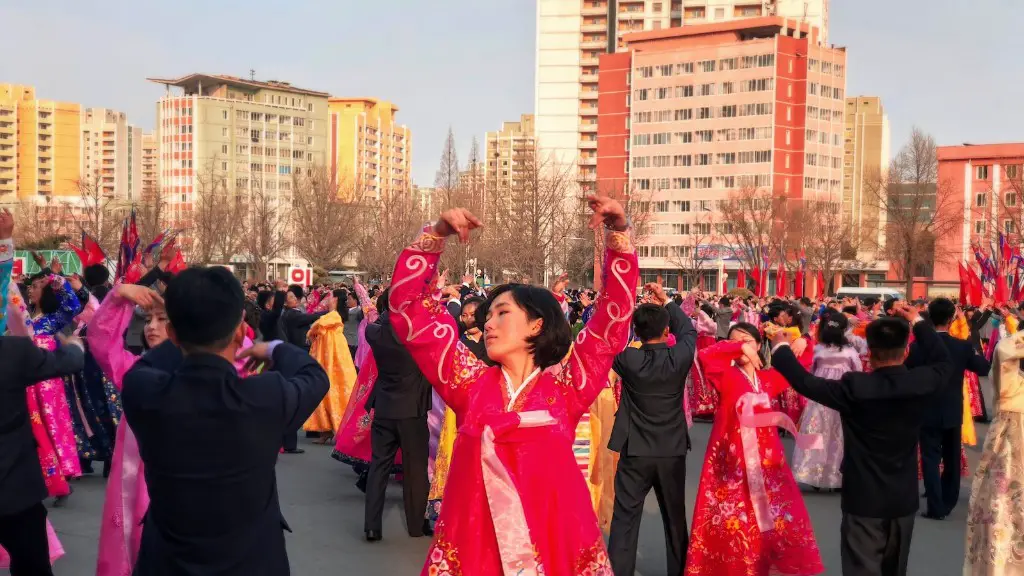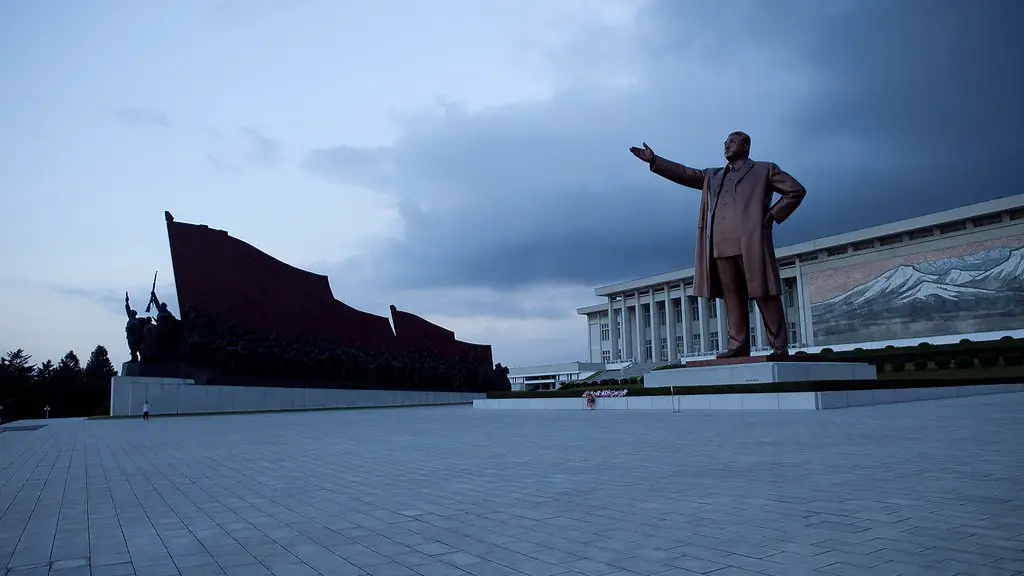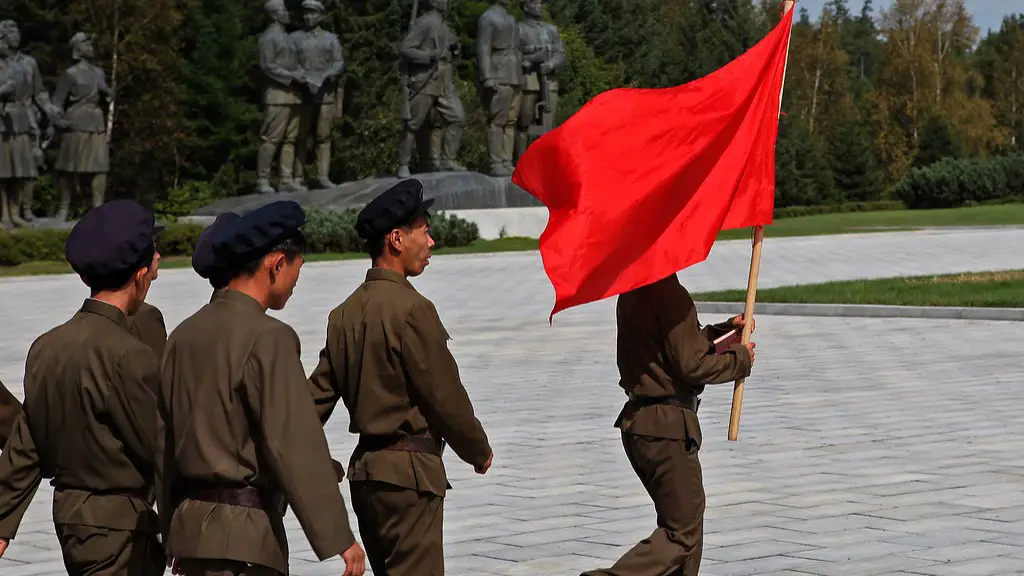Background Information
North Korea, officially known as the Democratic People’s Republic of Korea, is a one-party state located in East Asia. It is bordered by China and Russia to the north, and the Republic of Korea (South Korea) to the south. North Korea has been ruled by the same family for more than seven decades, and the current leader is Kim Jong-un. North Korea has been isolated from the international community for many years, and is subject to severe economic sanctions. Over the past decade, North Korea has also been accused of increased aggression towards it’s neighboring countries, testing of weapons of mass destruction, and development of nuclear weapons.
Relevant Data
According to the United Nations International Children’s Emergency Fund (UNICEF), more than 25% of North Koreans live below the poverty line and nearly 2 million children are chronically malnourished. In the past, North Korea has conducted multiple nuclear tests, ballistic missile test launches, and multiple human rights violations. Additionally, the United Nations states that North Korea has engaged in censorship of media and restricted access to information. These acts have made it very difficult for the outside world to access North Korea, and to gain a true understanding of what is happening inside the country.
Expert Perspectives
Experts from around the world weigh in on what the potential implications of North Korea’s activity could be. Richard Haass, president of the Council on Foreign Relations, states that “we don’t know what they are capable of, and we do know that they are one test or one rocket launch away from a greatly increased risk of making good on their threat of unleashing catastrophic violence.” Others maintain that North Korea is using its aggressive tactics as a form of deterrence and to maintain power within the region. Robert Litwak, a senior fellow at the Woodrow Wilson International Center for Scholars, explains that “North Korea is completely controlling these risks; it knows that it’s one test away from starting a war, which it doesn’t want to do, but it’s deterring attack.”
Insights and Analysis
Given the limited information available about North Korea, it is difficult to gain insight into the country’s intentions and its true capabilities. Some suggest that North Korea is simply engaging in saber-rattling and posturing, while others believe the country may be genuinely attempting to develop a nuclear weapons arsenal. The possibility that North Korea could be developing weapons of mass destruction should not be taken lightly, and it is a situation that should be monitored closely. At the same time, it is important to remember that North Korea is a country with its own set of goals and objectives, and any decisions made regarding it need to respect those goals.
Nuclear Programs and Potential Risks
North Korea has long maintained a nuclear program, and it is believed to have a small nuclear arsenal. Reports from the Organization for the Prohibition of Chemical Weapons (OPCW) indicate that, despite international pressure, North Korea has continued to advance its nuclear capabilities. North Korea’s nuclear program presents a number of potential risks, including the possibility of increased tensions between North Korea and its neighbors, as well as a heightened risk of nuclear conflict. In addition, North Korea has the potential to export nuclear technology, which could lead to further destabilization in the region.
Military and Humanitarian Issues
North Korea has also amassed a formidable military, which is made up of almost a million personnel, as well as an extensive network of missiles and other weapons. This military capability has been used to intimidate and threaten neighboring countries, and has caused increased tensions in the region. In addition, the country has an extensive record of human rights violations and is accused of running a system of forced labor and prison camps. These issues present another set of risks that could have far-reaching implications.
Alternatives to Military Action
Given the international pressure and potential risks, it is apparent that military action should be avoided when possible. Instead, experts suggest a few options to diffuse tensions, manage risk, and work towards a resolution. These include initiating negotiations, enforcing existing international agreements, and providing humanitarian aid. Of course, North Korea’s isolation and the lack of reliable information make these efforts difficult, but could be a viable option if tensions continue to mount.
Economic Impact on the Region
North Korea’s military build-up, nuclear program, and aggressive posturing could have significant economic implications throughout the region. Neighboring countries could be subject to trade sanctions, and North Korea’s nuclear tests could cause economic ripples across the globe. In addition, the region is already on edge, with tensions growing between North Korea, China, and the US. If a resolution is not reached, these economic implications could become even more severe.
Regional Security Issues
The implications of North Korea’s actions extend beyond economics and military implications. Regional security issues could arise as a result of North Korea’s actions, and these could impact the safety and security of millions of innocent people. Further, these security issues could have long-lasting impacts on the region, and could cause increased instability.
International Cooperation for a Solution
Given the potential risks of North Korea’s activity, the international community needs to work together to find a solution. This will require a focus on diplomatic options, such as negotiations and enforcement of existing sanctions, and an increase in humanitarian aid. Additionally, the international community must ensure that any action taken towards North Korea is done in a manner that respects the rights and objectives of all involved. Only by working together in a cooperative manner can the situation in North Korea be resolved in a manner that preserves peace and safety for all involved.
Rhetoric and the Media
The rhetoric used by North Korea, and by international media regarding the country, is an important factor to consider when discussing the situation in North Korea. While it is important to remain informed and aware of the country’s activities, it is also important to be wary of the rhetoric used. Many times, sensationalized language is used to describe the potential threats posed by North Korea, and such language could heighten the tensions between the country and its neighbors.
Military Deterrence and Arms Control Measures
Given the military capabilities of North Korea, it is important to consider the concept of deterrence when discussing the situation. Deterrence theory is based on the idea that countries will refrain from attacking or engaging in hostile actions due to the fear of retaliatory actions. To this end, many experts suggest that a strong military presence near North Korea can serve as a deterrent and help to de-escalate tensions in the region. Additionally, some suggest that arms control measures such as international treaties might be effective in preventing the further spread of weapons of mass destruction.
Economic Sanctions and other Solutions
International efforts have long focused on economic sanctions as a way to put pressure on North Korea. Such sanctions have proven to be effective in the past, although their efficacy has diminished in recent years. Additionally, it is important to consider more creative solutions, such as taking a diplomatic approach, increasing access to information, and providing humanitarian aid. Such solutions may not always be effective, but could still offer possible solutions in cases where traditional methods prove ineffective.
Dialogue and Negotiations
Experts suggest that dialogue and negotiations are essential to finding a peaceful resolution to the situation in North Korea. This could include direct talks between North Korea and its neighbors, as well as direct negations between international powers and North Korea. Such efforts can be difficult, however, and require a great deal of patience and compromise. Interestingly, increased engagement with North Korea by international powers could potentially open the door for other forms of progress in the region. In particular, increased dialogue could provide an opportunity to reduce hostilities and, potentially, reduce the risks of conflict.



